What Is The Fiscal Strain Caused By Immigrants? Pretty Much Nothing, Says OECD

Much ado has been made in Europe and the U.S. about immigrants flowing into developed countries, tapping social services and contributing to budget shortfall, but a report released Thursday by the Organization for Economic Cooperation and Development says the argument that immigrants are costing nations their wealth is moot.
“The question whether immigrants are net contributors to or a net drain on public finances is widely debated. Estimates suggest their impact is small, generally not exceeding 0.5 percent of GDP in either positive or negative terms,” said the Paris-based organization, whose members are made up of the 34 most-developed-world economies, including the U.S., Canada, Australia and the countries of Western Europe.
The largest fiscal burden of immigrants, it points out, isn’t the cash governments spend on the social services they tap, but rather that they tend to pay fewer taxes and contribute less to social security. The burden to social services is offset by the taxes they do pay.
The study focused on legal migrants, either permanent or temporary (seasonal temps), but Jean-Christophe Dumont, the OECD official who headed the study, told the New York Times that illegal immigrants tend to be “net contributors” because their access to services is more limited in many countries.
Another finding: the younger the immigrant, the higher the contribution, and that effect is stronger in the U.S., which has a weaker social safety net than Europe.
Amid the immigration debate, the conservative Heritage Foundation released a study in May claiming that providing amnesty to illegal immigrants would cost the country $6.3 trillion over their lifetimes.
The report was criticized for assuming all migrants would spend the rest of their lives poor, taking $9.4 trillion in publicly funded services, such as education and fire-department protection, while only paying $3.1 trillion in taxes.
Even other conservative groups have slammed the study, including the Cato Institute, Americans for Tax Reform, and Republicans Paul Ryan and Marco Rubio.
© Copyright IBTimes 2025. All rights reserved.






















